 Ohio's Republican Sec. of State Jon Husted has called on fellow Republicans in the legislature to repeal their controversial Election Reform bill, rather than see it face a voter referendum currently slated for this November's ballot.
Ohio's Republican Sec. of State Jon Husted has called on fellow Republicans in the legislature to repeal their controversial Election Reform bill, rather than see it face a voter referendum currently slated for this November's ballot.
The law, if it is not rejected by voters, will severely shorten the time for Early Voting and will ban it all together on the Sunday before Election Day in the Buckeye State, in a way that is geared towards suppressing Democratic votes. The bill also includes other major barriers to voting such as a prohibition on county Boards of Election mailing absentee ballot request forms to voters and a ban on poll workers instructing voters where their correct precinct is located. Opponents of the law have noted that some 200,000 voters in Columbus alone --- or 4 in 10 votes cast there in 2008 --- would have had to cast their vote in a different manner in 2012 has the law been allowed to take effect this year as planned.
Husted, the state's chief election official, elected in 2010, had worked with GOP legislators in crafting the bill which was passed and signed by Republican Gov. John Kasich last year, before being met with a wildly successful petition campaign in support of a "voter veto" of the bill. That campaign, led by progressive groups such as Fair Elections Ohio, garnered more than 300,000 signatures, or more than 75,000 above the total required to put the bill on hold and place it on the ballot for a popular vote. The result is that, last December, the bill was officially suspended for 2012, when Republicans had hoped it might help suppress Democratic-leaning voters in the swing-state's Presidential election. Instead, the law is now set to be on the November 2012 ballot for voter approval or rejection.
The Sec. of State called on fellow Republicans to overturn the bill in the legislature, scrap it, and revisit the issue after the 2012 election, rather than allowing it to remain on the ballot in November. Those remarks have raised the hackles of some powerful GOP lawmakers in Ohio.
Husted is developing a record for standing against some of the most radical elements of his own party's agenda in some cases, as seen, for example, in his outspoken condemnation of an attempt to institute polling place Photo ID restrictions on voters in the same bill last year, as well as a bi-partisan effort in 2007, with the previous Democratic Sec. of State, to do away with 100% unverifiable touch-screen voting systems in the Buckeye State...
In remarks reported by Jo Ingles of WKSU on Thursday, Republican Senate President Tom Niehaus blasted Husted for his recent comments on the sweeping Election Reform bill, charging he hadn't consulted with lawmakers before offering his opinions to the Ohio Association of Election Official about scrapping it entirely.
"When people put a headline in front of good public policy, yes, that bothers me," Niehaus said.
In his own defense, Husted, who had worked closely with lawmakers in crafting the bill, suggested the referendum was likely to cause confusion for voters this year, according to AP.
On WKSU, he responded to Niehaus' criticism: "All I was trying to do is to make the point that if it’s not going to become law before November and we were going to look at other ideas, wouldn’t it make sense for everybody to just repeal the bill so we didn’t have the controversy and hit the reset button and come together to work on these issues so that we have less controversy around our election law in this state."
It's not the first time Husted has come out publicly against his own party. As The BRAD BLOG noted last Summer, before the bill was passed by the State Assembly, he spoke out forcefully against an additional voter suppression measure that Republicans were attempting to add the bill which would likely have disenfranchised thousands of Ohio voters.
Said Husted in a powerful statement posted to the official Ohio Sec. of State's website at the time:
The crystal clear remark strikes directly at the heart of wholly-unsubstantiated GOP claims in state after state that such polling place restrictions are necessarily in order to combat "voter fraud" by polling place impersonation. Husted's assertion --- that such measures fail to protect against fraud, while keeping legal voters from being able to cast their otherwise legal vote --- is backed up by every independent study ever published, and even by evidence proffered by Republicans themselves.
In 2007, when Husted served as Ohio's Republican House Speaker, he joined with then Democratic Secretary of State Jennifer Brunner, in calling for a ban on 100% unverifiable touch-screen voting systems in the state. The call came after a bi-partisan, independent study carried out by Brunner, had found, as she stated at the time during a press conference Husted participated in, that "Ohio's electronic voting systems have 'critical security failures' which could impact the integrity of elections in the Buckeye State."
Despite the findings which led to some Ohio counties moving to paper ballot systems, most Republican election officials in the state fought hard to keep unverifiable electronic voting systems in place, and so they are slated, once again, to be used in the majority of the state's 88 counties during the 2012 Presidential election. There is no way to know if even a single vote cast on such systems has even been recorded accurately as per any voter's intent.


 Sunday 'Close Enough' Toons
Sunday 'Close Enough' Toons A Pretty Weak 'Strongman': 'BradCast' 10/30/25
A Pretty Weak 'Strongman': 'BradCast' 10/30/25 'Green News Report' 10/30/25
'Green News Report' 10/30/25
 Proposal for 'First Politically Viable Wealth Tax' Takes Shape in CA: 'BradCast' 10/29/25
Proposal for 'First Politically Viable Wealth Tax' Takes Shape in CA: 'BradCast' 10/29/25 Monster Storm, Endless Wars, Gamed Elections:
Monster Storm, Endless Wars, Gamed Elections: 'Green News Report' 10/28/25
'Green News Report' 10/28/25 Let's Play 'Who Wants
Let's Play 'Who Wants Sunday 'Cartoonists Dilemma' Toons
Sunday 'Cartoonists Dilemma' Toons Exiled NOAA Scientists Resurrect Critical Disaster Database: 'BradCast' 10/23/25
Exiled NOAA Scientists Resurrect Critical Disaster Database: 'BradCast' 10/23/25  'Green News Report' 10/23/25
'Green News Report' 10/23/25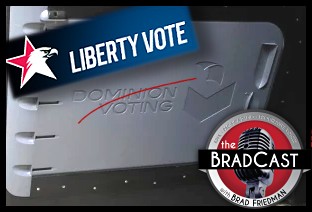 Trump-Allied GOP Partisan Buys Dominion Voting Systems: 'BradCast' 10/22/25
Trump-Allied GOP Partisan Buys Dominion Voting Systems: 'BradCast' 10/22/25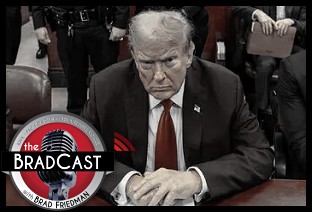 Trump, Republican Law(lessness) & (Dis)Order: 'BradCast' 10/21/25
Trump, Republican Law(lessness) & (Dis)Order: 'BradCast' 10/21/25 'Green News Report' 10/21/25
'Green News Report' 10/21/25 Celebrating 'No Kings': 'BradCast' 10/20/25
Celebrating 'No Kings': 'BradCast' 10/20/25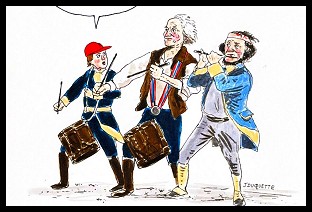 Sunday 'How It Started' Toons
Sunday 'How It Started' Toons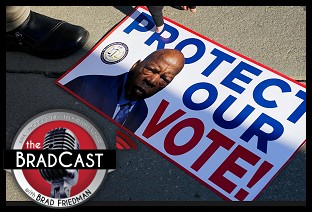 SCOTUS Repubs Appear Ready to Gut Rest of Voting Rights Act: 'BradCast' 10/16/25
SCOTUS Repubs Appear Ready to Gut Rest of Voting Rights Act: 'BradCast' 10/16/25 'Green News Report' 10/16/25
'Green News Report' 10/16/25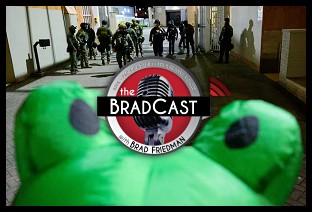 The 'Epstein Shutdown' and Other Autocratic Nightmares: 'BradCast' 10/15/25
The 'Epstein Shutdown' and Other Autocratic Nightmares: 'BradCast' 10/15/25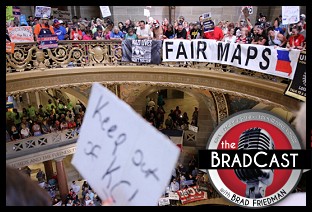 Group Vows to Block MO's GOP U.S. House Gerrymander: 'BradCast' 10/14/25
Group Vows to Block MO's GOP U.S. House Gerrymander: 'BradCast' 10/14/25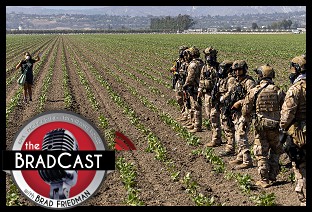 Trump Labor Dept. Warns Trump Policies Sparking Food Crisis: 'BradCast' 10/9/25
Trump Labor Dept. Warns Trump Policies Sparking Food Crisis: 'BradCast' 10/9/25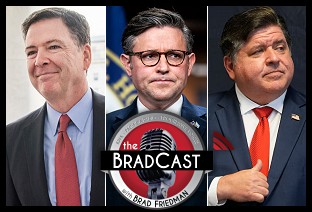 Trump's Losing Battles: 'BradCast' 10/8/25
Trump's Losing Battles: 'BradCast' 10/8/25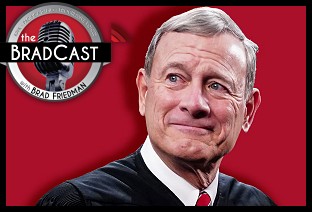 Trump, Roberts and His Stacked, Packed and Captured SCOTUS: 'BradCast' 10/7/25
Trump, Roberts and His Stacked, Packed and Captured SCOTUS: 'BradCast' 10/7/25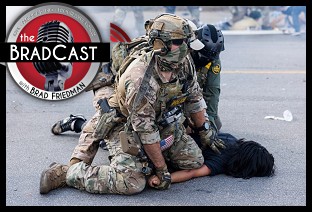 Trump Attempting His 'Invasion from Within': 'BradCast' 10/6/25
Trump Attempting His 'Invasion from Within': 'BradCast' 10/6/25 Biden Budget Expert: Mass Firings in Shutdown 'Illegal': 'BradCast' 10/2/25
Biden Budget Expert: Mass Firings in Shutdown 'Illegal': 'BradCast' 10/2/25 Why is DOJ Suing 'Blue' States for Their Voter Databases?: 'BradCast' 10/1/25
Why is DOJ Suing 'Blue' States for Their Voter Databases?: 'BradCast' 10/1/25
 VA GOP VOTER REG FRAUDSTER OFF HOOK
VA GOP VOTER REG FRAUDSTER OFF HOOK Criminal GOP Voter Registration Fraud Probe Expanding in VA
Criminal GOP Voter Registration Fraud Probe Expanding in VA DOJ PROBE SOUGHT AFTER VA ARREST
DOJ PROBE SOUGHT AFTER VA ARREST Arrest in VA: GOP Voter Reg Scandal Widens
Arrest in VA: GOP Voter Reg Scandal Widens ALL TOGETHER: ROVE, SPROUL, KOCHS, RNC
ALL TOGETHER: ROVE, SPROUL, KOCHS, RNC LATimes: RNC's 'Fired' Sproul Working for Repubs in 'as Many as 30 States'
LATimes: RNC's 'Fired' Sproul Working for Repubs in 'as Many as 30 States' 'Fired' Sproul Group 'Cloned', Still Working for Republicans in At Least 10 States
'Fired' Sproul Group 'Cloned', Still Working for Republicans in At Least 10 States FINALLY: FOX ON GOP REG FRAUD SCANDAL
FINALLY: FOX ON GOP REG FRAUD SCANDAL COLORADO FOLLOWS FLORIDA WITH GOP CRIMINAL INVESTIGATION
COLORADO FOLLOWS FLORIDA WITH GOP CRIMINAL INVESTIGATION CRIMINAL PROBE LAUNCHED INTO GOP VOTER REGISTRATION FRAUD SCANDAL IN FL
CRIMINAL PROBE LAUNCHED INTO GOP VOTER REGISTRATION FRAUD SCANDAL IN FL Brad Breaks PA Photo ID & GOP Registration Fraud Scandal News on Hartmann TV
Brad Breaks PA Photo ID & GOP Registration Fraud Scandal News on Hartmann TV  CAUGHT ON TAPE: COORDINATED NATIONWIDE GOP VOTER REG SCAM
CAUGHT ON TAPE: COORDINATED NATIONWIDE GOP VOTER REG SCAM CRIMINAL ELECTION FRAUD COMPLAINT FILED AGAINST GOP 'FRAUD' FIRM
CRIMINAL ELECTION FRAUD COMPLAINT FILED AGAINST GOP 'FRAUD' FIRM RICK SCOTT GETS ROLLED IN GOP REGISTRATION FRAUD SCANDAL
RICK SCOTT GETS ROLLED IN GOP REGISTRATION FRAUD SCANDAL VIDEO: Brad Breaks GOP Reg Fraud Scandal on Hartmann TV
VIDEO: Brad Breaks GOP Reg Fraud Scandal on Hartmann TV RNC FIRES NATIONAL VOTER REGISTRATION FIRM FOR FRAUD
RNC FIRES NATIONAL VOTER REGISTRATION FIRM FOR FRAUD EXCLUSIVE: Intvw w/ FL Official Who First Discovered GOP Reg Fraud
EXCLUSIVE: Intvw w/ FL Official Who First Discovered GOP Reg Fraud GOP REGISTRATION FRAUD FOUND IN FL
GOP REGISTRATION FRAUD FOUND IN FL

































